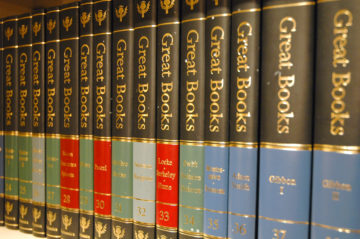by Varun Gauri

At the University of Chicago, I majored in an interdisciplinary concentration most easily characterized as Great Books. I studied with an Indian poet, a Japanese postmodern literary critic, and an historian who admired Michel Foucault, but my most influential professors were men influenced by Leo Strauss, including Allan Bloom, Joseph Cropsey, Leon Kass, and Nathan Tarcov, a smart and stirring group of teachers. They were also politically conservative, though I was too politically naive, and too flattered by their approval, to notice. Junior year, invited to speak about my selected Great Books at a humanities conference, I talked about the changing valence of cleverness in Homer, Aristotle, and Descartes. The conference took place in the context of the canon wars, and when during Q&A people asked me if there were women or non-European authors on my list, I offhandedly threw out a few names. A mentor would later compliment my disarming ingenuousness.
Some of the professors regretted their Eurocentrism but felt helpless to correct it, given their linguistic limitations. Others wore it proudly. Most notoriously, Saul Bellow supposedly said, “When the Zulus produce a Tolstoy, we will read him,” a position that Charles Taylor would take down in “The Politics of Recognition” (though, sadly, after I graduated). Even in the 1980s, though, many of us could tell there was something odd about the idea of a literary or philosophical canon in a multicultural society and long globalized world of letters. For what it was worth (and it wasn’t much, since canon expansion grows out of the same impulse as canon construction, tokenism in response to fetishism, still the scorekeeping), I made a point to include Hannah Arendt and The Mahabharata on my lists.
Looking back, I’m stunned not so much by the program’s male Eurocentrism, which was advertised (caveat emptor), but its insularity. Why did no one tell me about Becker’s Denial of Death, whose reinterpretation of psychoanalysis would have informed my essay on heroism? I read Nietzsche’s takedown of Christian morality but had no idea that Dewey had developed a more American and optimistic response to the death of God. I wish I’d known about Charles Taylor’s work on moral horizons, Margaret Atwood’s world-building, Tagore’s cosmopolitanism. The Great Conversation, it turns out, is much wider than I knew. It is, in fact, still going on. I might even have been a participant, in my own way, not just an eavesdropper.
Equally shocking is the realization that my years in the Great Books curriculum were, however provincial, close to the high water mark for humanism. In an essay called “The End of the English Major,” Heller documents that, over the last two decades, many universities have seen enrollments in the humanities and English departments shrink by more than half. Facing steep declines in federal funding, universities have come to resemble corporatized revenue centers; students, worried about their economic prospects, are running to STEM majors; so humanities departments are increasingly having to respond to consumer demand. Many are lowering rigor and quality, leading to declining morale, disappointment, a loss in reputation, and further enrollment declines. The humanities have, perhaps as a result, suffered in popular culture — these days, when newspapers seek insight on human nature, they typically turn to social scientists, not literati or philosophers.
It feels heartbreaking to me that the humanities have declined so. While everyone feels nostalgia for the old days, and I’m no exception, I don’t believe it’s mostly that. I wasn’t happy with the exclusiveness of the canon, and I didn’t believe, with some of my teachers, that a common curriculum was essential for nation-building. I wasn’t convinced those Great Books were uniquely elevating texts. Rather, I miss the feeling of being alive when I read and discussed them.
Plato famously wrote that philosophy begins in wonder. I recall the shock, sitting in a library late at night, immersed in an author’s quest for meaning, feeling wrenched out of a college student’s preoccupations, growing suddenly aware of previously invisible and concealed entities now coming forward, dead terms and concepts suddenly complex, unfrozen, and unsettled. That shock of being a stranger in my own world. I felt like I was waking up. Those were intense and enlivening experiences, though I don’t want to say they were necessarily good. I sympathize with the narrator of an Alice Munro story who, thinking of her father’s death, says, “Awe—what was that supposed to be? A fit of the shivers when you looked out the window? Once you knew what it was, you wouldn’t be courting it.”
Still, I’m grateful to have had those experiences, and sad that fewer students know them. Despite my nostalgia, I’m not as pessimistic as the headlines. I don’t expect those experiences to become the hobby horse of mere handfuls of reclusive academics, nor do I believe these are the last days of the humanities. Education levels and learning around the world are too high for that now, and questions of meaning too pervasive. I look forward to more globalized, inclusive, and imaginative curricula aimed at simulating wonder, even if the Great Books are now out of fashion.
